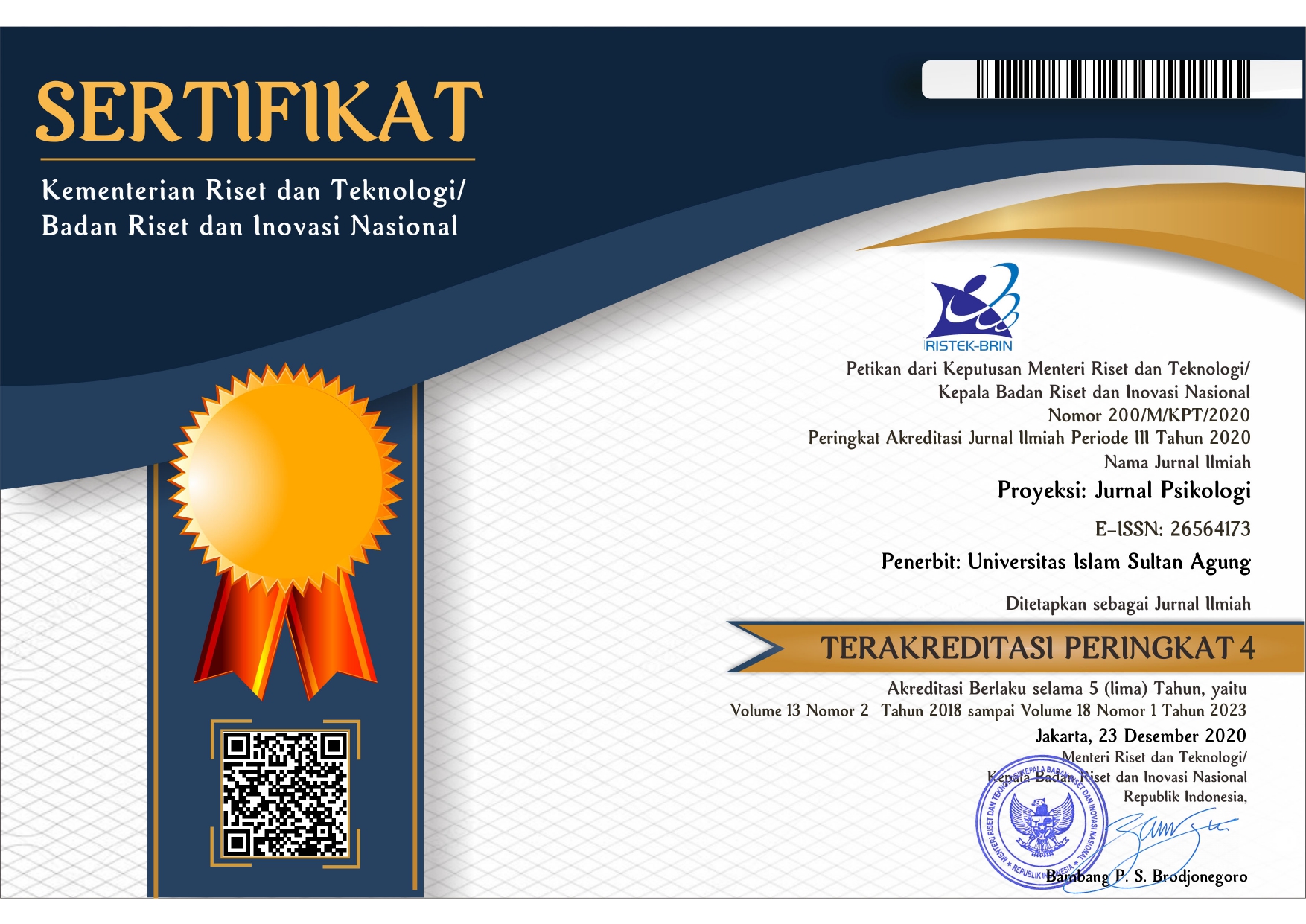PERAN EFIKASI DIRI DAN DUKUNGAN SOSIAL TEMAN SEBAYA TERHADAP BELAJAR BERDASAR REGULASI DIRI PADA MAHASISWA UNIVERSITAS ISLAM SULTAN AGUNG SEMARANG
Abstract
Penelitian ini bertujuan untuk mengetahui peran efikasi diri dan dukungan sosial teman sebaya terhadap belajar berdasar regulasi diri pada mahasiswa Universitas Islam Sultan Agung Semarang. Penelitian ini menggunakan metode kuantitatif korelasional. Populasi dalam penelitian ini adalah mahasiswa Universitas Islam Sultan Agung Semarang. Sampel penelitian ini berjumlah 150 mahasiswa Universitas Islam Sultan Agung Semarang. Metode pengambilan sampel menggunakan simple random sampling. Alat ukur yang digunakan dalam penelitian ini terdiri dari tiga skala. Skala belajar berdasar regulasi diri berjumlah 68 aitem yang memiliki koefisien reliabilitas 0,941 dengan indeks daya beda aitem bergerak antara 0,277 sampai 0,683. Skala efikasi diri berisi 30 aitem yang memiliki koefisien reliabilitas 0,896 dengan indeks daya beda aitem yang bergerak antara 0,256 sampai 0,693. Serta skala dukungan sosial teman sebaya berisi 40 aitem yang memiliki koefisien reliabilitas 0,919 dengan indeks daya beda aitem yang bergerak antara 0,301 sampai 0,726. Analisis data menggunakan analisis regresi ganda dan parsial. Hasil penelitian menunjukskan adanya peran positif efikasi diri dan dukungan sosial teman sebaya terhadap belajar berdasar regulasi diri dengan diperoleh skor R= 0,325 dan Fhitung= 8,665, p= 0,000 (p<0,05). Variabel efikasi diri dan dukungan sosial teman sebaya secara bersamaan memiliki sumbangan efektif sebesar 10,5% terhadap variabel belajar berdasar regulasi diri. Uji korelasi parsial efikasi diri dengan belajar berdasar regulasi diri diperoleh skor rx1y= 0,178 dengan signifikan 0,030 (p<0,05). Hasil tersebut menunjukkan adanya peran positif efikasi diri terhadap belajar berdasar regulasi diri. Uji korelasi parsial dukungan sosial teman sebaya dengan belajar berdasar regulasi diri diperoleh skor rx2y= 0,173 dengan signifikan 0,035 (p<0,05). Hasil tersebut menunjukkan adanya peran positif dukungan sosial teman sebaya terhadap belajar berdasar regulasi diri.
Keywords
Full Text:
PDFReferences
Bandura, A. (1977). Self-efficacy : toward a unifying theory of behavioral change. Psychological Review, 84(2), 191–215.
Bandura, A. (2012). On the functional properties of perceived self-efficacy revisited. Journal of Management, 38(1), 9–44. https://doi.org/10.1177/0149206311410606
Chen, P., & Zimmerman, B. (2007). A cross-national comparison study on the accuracy of self-efficacy beliefs of middle- school mathematics students. The Hournal of Experimental Education, 75(3), 221–244. https://doi.org/10.3200/JEXE.75.3.221-244
Clark, N. M., & Zimmerman, B. J. (2014). A social cognitive view of self-regulated learning about health. Health Education & Behavior, 41(5), 485–491. https://doi.org/10.1093/her/5.3.371
Dennis, jessica M., Phinney, J. S., & Chuateco, L. I. (2005). The role of motivation, parental support, and peer support in the academic success of ethnic minority first-generation college students. Journal of College Student Development, 46(3), 223–236. https://doi.org/10.1353/csd.2005.0023
Dibenedetto, M. K., & Bembenutty, H. (2013). Within the pipeline : self-regulated learning , self-efficacy , and socialization among college students in science courses. Learning and Individual Differences, (23), 218–224.
Effeney, G., Carroll, A., & Bahr, N. (2013). Self-Regulated Learning : Key strategies and their sources in a sample of adolescent males, 13, 58–74.
Gottlieb, B. H., & Bergen, A. E. (2010). Social support concepts and measures. Journal of Psychosomatic Research, 69(5), 511–520. https://doi.org/10.1016/j.jpsychores.2009.10.001
Hafzan, A., Abdullah, A. N., Husain, K., & Abdullah, N. (2015). The role of learning approaches as mediator between peer social support and self regulated learning among enginee. Asian Social Science, 11(17), 67–73. https://doi.org/10.5539/ass.v11n17p67
Khan, M. (2013). Academic self-efficacy , coping , and academic performance in college. Internasional Journal of Undergraduate Research and Creative Activities, 5(October), 4. https://doi.org/tttp://dx.doi.org/10.7710/2168-0620.1006
Labuhn, A. S., Zimmerman, B. J., & Hasselhorn, M. (2010). Enhancing students’ Self-regulation and mathematics performance : the influence of feedback and self-evaluative standards. Matacognition Learning, 5, 173–194. https://doi.org/10.1007/s11409-010-9056-2
Mulyana, E., Mujidin, & Bashori, K. (2015). Peran motivasi belajar, self-efficacy, dan dukungan sosial keluarga terhadap self-regulated learning pada siswa. Psikopedagogia, 4(1), 165–173.
Pintrich, P. R. (2004). A conceptual framework for assessing motivation and self-regulated learning in college students. Educational Psychology Review, 16(4), 385–407.
Sarafino, E. P. (2008). Health psychology biopsychosocial interactions (6th ed.). United States: John Willey & Sons, Inc.
Sari, P. K. P., & Indrawati, E. S. (2016). Hubungan antara Dukungan Sosial Teman Sebaya dengan Resiliensi Akademik pada Mahasiswa Tingkat Akhir Jurusan x Fakultas Teknik Universitas Diponegoro, 5(April), 177–182.
Setiawan, A. I., & Darminto, E. (2013). Pengaruh dukungan sosial terhadap stres kerja pada karyawan, 1(3).
Zimmerman, B. J. (2000). Self-Efficacy : an essential motive to learn. Contemporary Educational Psychology, 25, 82–91. https://doi.org/10.1006/ceps.1999.1016
Zimmerman, B. J. (2008). Investigating self-regulation and motivation : historical background , methodological developments, and future prospects. American Educational Research, 45(1), 166–183. https://doi.org/10.3102/0002831207312909
Zimmerman, B. J. (2013). From cognitive modeling to self-regulation: A social cognitive career path. Educational Psychologist, 48(3), 135–147. https://doi.org/10.1080/00461520.2013.794676
Zimmerman, B. J., & Cleary, T. J. (2009). Motives to self-regulate learning: a social-cognitive account.
DOI: http://dx.doi.org/10.30659/jp.14.1.53-62
Refbacks
- There are currently no refbacks.

Proyeksi by http://jurnal.unissula.ac.id/index.php/proyeksi/ is licensed under a Creative Commons Attribution-ShareAlike 4.0 International License.

